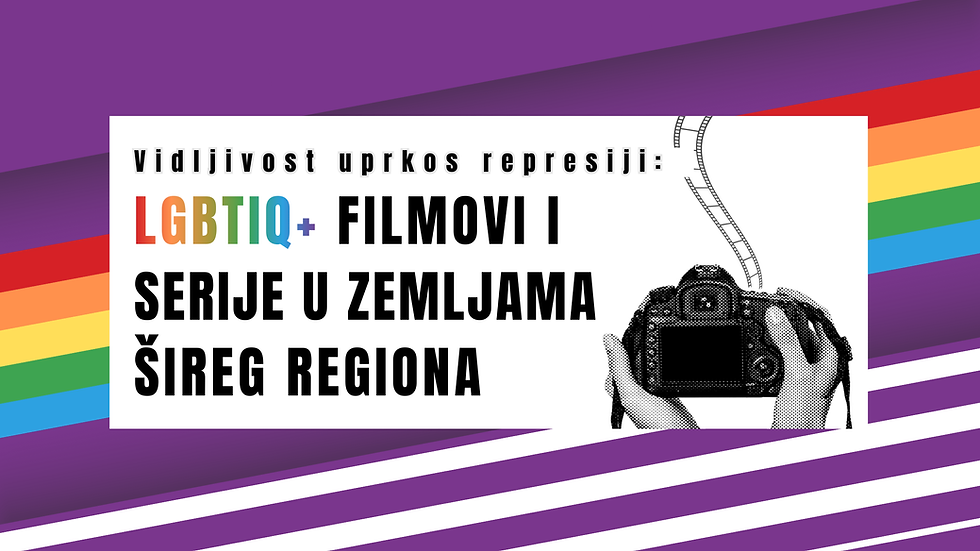LGBTI Writings: Am I gay "enough"?
- Sep 22, 2021
- 3 min read
Updated: Jan 11, 2022
Back in middle school, I realized that my attraction towards Vanesa, a friend from the class, is not really typical for girls my age. They didn’t fall in love with their gals, make their hair, hug them or cuddle them. They didn’t want to impress that cute girl with their (not so sharp) football play, while I did... Oops!
What girls my age did seem to do back then, including me as well – as it will turn out, is going crazy for the boys from the other class. My football-seducing techniques didn’t seem to work on them, unfortunately they didn’t have long hair so they can’t be braided.
So, up until high school I was slowly discovering about the concept of bisexuality.
The definition says: “Bisexuality, as a sexual orientation, involves emotional and sexual attraction towards people of both male and female sex/gender. It concerns a broad spectrum that involves many things: people who are attracted by both male and female; people who are, most of the time attracted to one gender/sex, but doesn’t exclude attraction towards the other gender/sex; people who experience their sexuality as fluid and changeable; people who look at the concept of attraction regardless of sex/gender, and deem other traits as a base of attraction; people who don’t consider that there are only two gender and that people are attracted to one, the other, or both.”
One coming out after another in high school constantly put me in conflict with my friend’s statement: “Well, you don’t look like it. I didn’t expect that.” which made me feel questioning at night – “Am I really queer? Am I gay enough?” Later, those question turned out to come as insecurity in my own identity when I grew up and found a girlfriend. Then I had more questions: “Am I really bi?” “What if they were right?” “Why am I lying to myself?”
Was it ever written anywhere, inside a definition, perhaps some recognized and legit piece of literature, of how a bisexual person should look like? Do they have to dress, behave or get hair done in a certain way? Do they have to be skinny, fat, quiet, crazy, shy, submissive, wild...?
It’s not written anywhere, because they don’t have to be any of those things.
My femininity doesn’t make me any less bisexual, it doesn’t affect my attraction towards women. In the same way, somebody’s femininity or masculinity, being binary or not, doesn’t determine whether they’re gay enough, or lesbian enough, or bi enough.
There is not person who looks gay or lesbian. Gender expression and physical looks can’t and must not be determinants that will excomminicate people from society.
A lot of people have heard these things: “But, you don’t look like you’re gay/lesbian/bi/trans.”, whether it’s about a woman or a man who doesn’t fit inside the stereotypical mould they force us into, whether it’s about bisexual people in heterosexual relationship, or trans people who “pass” as cisgender.
This behaviour of society towards queer people “passing” as cis/hetero creates a phenomenon known to psychologists as “Impostor”, which makes us feel guilt, confusion and anxiety. Also, it can affect queer people to change their dressing style or a way of expressing gender just for the sake of fitting in – which is definitely not healthy for them, especially if they’re uncomfortable with it.
We should express, dress and walk in a way that suits only ourselves, and in a way that makes us feel most comfortable. We shouldn’t let cishet* society to change us by telling us that we don’t belong somewhere just because we don’t fit inside their perception of the world.
Nobody should change themselves because of distorted perception of their friends or partners who make them feel less valuable, despite of our sexual orientations. It just takes to find people who have a wide and insightful view of the world, who accept you for who you are. If you’re not in a situation to sorround yourself with these kind of people in real life, queer online communities have a beautiful network of support that can give you the strength to pursue your true self.
Put your true self above all else, and in time you will find the right people.
Author: Anonymous
This article was written as part of the project "Access to Justice for LGBTI persons in Tuzla Canton", which is funded by the Norwegian Helsinki Committee. The article does not necessarily express the views of the Norwegian Helsinki Committee, but only the author.
*cishet – an abbrevation for cisgender heterosexual people/society.




Comments